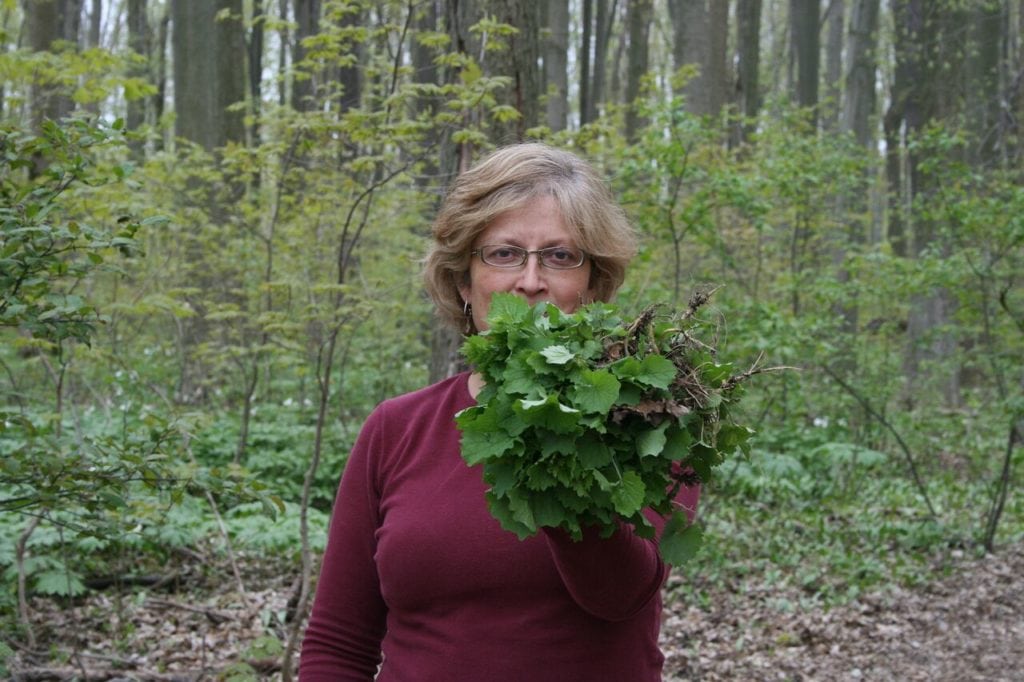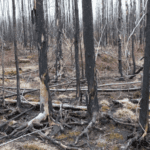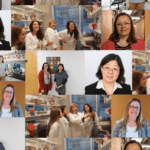Dawn Bazely is a Professor of Biology at York University. It was the first tenure-track position she applied for after her postdoc in 1989, and she’s been there ever since. Her academic career, however, has been defined by positions in both Ontario and her native England, and has been marked by global political events.

Bazely wanted to be a biologist since she was 10 years old. While she credits her father, an engineer, with exposing his two daughters to math and science when they were young, her interest was largely sparked by a keen Kenyan teacher at her London elementary school.
“He took us to the Natural History Museum in Kensington, where we focused on African natural history,” Bazely recalls. “After that trip, I decided I was going to be a biologist!” Other than seeing Sir David Attenborough on TV, however, she didn’t really know what a career in ecology could look like.
Following completion of high school in 1977, Bazely had planned to attend McGill University. However, it was the tumultuous era of René Lévesque’s Parti Québécois, and Bazely’s parents nagged her to switch to the University of Toronto (U of T) instead.
When it came time to sign up for an undergrad major, Bazely toyed briefly with the idea of going into medicine. “But there was a slight problem: I never could stand the sight of blood, or doing dissections,” she laughs. Luckily, she discovered the university’s new biogeography major and environmental studies minor programs.
Bazely took several ecology courses with Professor Bob Jefferies, who invited her to apply for the newly launched NSERC Summer Undergraduate Research Program. Funding from that program allowed her to join the Jefferies lab in 1980 as a field assistant to grad student Sue Cargill, for her first northern field season on Hudson Bay. She worked out of the Queen’s University Lesser Snow Goose Camp, located east of Churchill at La Pérouse Bay. Established in the 1960s by geneticist Fred Cooke, the camp hosted an international community of field researchers, which was fantastic for networking.
Bazely spent her first two years in camp making the most of her experience as a field assistant.“I collected mud samples for my undergraduate honours thesis in palynology,” she recalls, “and the data I collected for my NSERC undergraduate research project, which ran in parallel to my field assistant duties, were published in 1983.”
Following completion of her B.Sc., Bazely took a year off from university. “I’m hugely in favour of gap years,” she says. “They give you the opportunity to think about what you really want to do.”
Bazely ultimately decided to do an M.Sc., and applied to both the Jefferies lab at U of T and Martin Kellman’s lab at York University. “Kellman was doing cool biogeography fieldwork in Belize,” Bazely recalls. “But the idea of poisonous snakes put me off, as I felt more comfortable handling the risk of polar bears in the field. After all, I’d already spent two summers carrying a shotgun on the shores of Hudson Bay.”
Thus, Bazely signed on as a botany M.Sc. student with Jefferies and spent an additional three summers at the Lesser Snow Goose Camp. Bazely credits Jefferies with giving her a huge amount of autonomy with her research, allowing her to handle everything from contracting helicopters to move her research team, to attending international conferences while still an undergrad. “I wasn’t babied as a young adult, and this approach helped me develop confidence in my research abilities,” she says.

Following her M.Sc., Bazely had to choose between Ph.D. opportunities in the UK and Australia. “I was offered a scholarship to work at Oxford, as well as a Commonwealth Scholarship for Macquarie University in Australia. But I chickened out of going so far abroad,” she says. “I decided to go back to the UK, where I’d grown up. So although I think moving out of one’s comfort zone is a good thing, it’s important to recognize when the water might be getting a little too deep!”
At Oxford, Bazely studied sheep grazing behaviour with the support of a Royal Commission for the Exhibition of 1851 Science Scholarship. “It was a natural progression for me to study herbivore behaviour after studying the impact of herbivory on vegetation for my M.Sc.” she explains. However, when she went to a reception for the scholarship winners, she was asked where her partner was––the assumption being that it was men who won these STEM scholarships.
Bazely had actually met her husband, a seabird biologist, within four weeks of arriving at Oxford. “He was finishing his D.Phil. and was recovering from having fallen down a cliff,” recalls Bazely. “A few months later, he got a job in Shetland, Scotland, so we had an extended long distance relationship.”
Four years later, Bazely completed her Ph.D. and continued her work with a Junior Research Fellowship (JFR; similar to a postdoc) at Oxford.
Midway during her doctoral research, Bazely’s husband (now at WWF Canada) was transferred from Shetland down to Hertfordshire, near Cambridge. For the first time in two years, they were only two train rides apart. Following her JRF at Oxford, therefore, Bazely moved on to a second JRF at Cambridge University’s Selwyn College. It was there that she began working on St. Kilda, an isolated archipelago in Scotland, learning about fungal endophytes in grasses.
Following her JRF positions, Bazely wanted to return to Canada. “Higher education was subject to major budget cuts under Margaret Thatcher’s government,” Bazely explains. “Thatcher was all about neo-liberalism. Her government rejected the idea of education as a public good, and many university departments and programs were closed down.”
Bazely applied for an NSERC postdoctoral fellowship, but was unsuccessful. She was, however, successful at landing an interview at York University in 1989, where she was awarded her first (and current!) tenure-track position. Her achievement was somewhat dimmed, however, by fellow male students insisting that she only got the job because she was a woman. She was also surprised, on arriving at York, to be welcomed by a colleague who said: “This is a woman; I thought we hired a man.” Apparently they had mistaken ‘Dawn’ for ‘Don!’
Though a highly accomplished scientist, Bazely says she’s pretty low key about her achievements. “Strong, assertive women often get a raw deal,” she explains. “It’s amazing how frequently my expertise and experience are simply not acknowledged, even today. But I understand, societally, why this is. For me, science is a group and community enterprise. So these days I’m particularly interested in helping fellow women in STEM to understand issues relating to systemic bias, and equity, diversity, and inclusivity.”

She also finds that she’s had to overcome the childhood social norms in which she was immersed. “I grew up bombarded by messages about the need to act like a lady. And my mum really did say, a lot, that children should be seen and not heard.” She credits her analytical personality and extensive reading with allowing her to move beyond those childhood messages and become a feminist.
Bazely has two daughters, the first of whom was born just before she got tenure at York University. “There’s no good time for a woman wanting a career to have kids,” she says.“ I have no doubts that my kids knocked back my career in diverse ways. Having a family, plus what looks like a successful career, has been a struggle at every turn, with hard choices and sacrifices to be made. I am well aware of the consequences of each and every decision that I have made.” Bazely notes that she had a great support system in both her husband and her parents, who did a lot of babysitting and daycare pickups when the girls were young.
Bazely recommends that students apply for many scholarships and grants to give themselves choice and opportunity. “It’s okay to turn down one or two awards,” she says. “You can pick and choose from a few options.” She also strongly recommends that students explore moving to another university for their graduate studies, even though she stayed at U of T for her M.Sc. “Get out of your comfort zone,” she says.
Bazely also recommends finding and taking advice from as many mentors as possible. She notes, sadly, that many of her influential mentors have died. To pay it forward, she has taken on a strong mentoring role for young women, so that they can benefit from lessons she learned the hard way. She also feels it’s critical for senior women in STEM to advocate for equity, diversity, and inclusion, given that Canadian policy changes to improve the representation of women in STEM have either not succeeded (as evidenced by the lack of women in senior STEM positions) or are limited.
“It appears that some of my colleagues blame the absence of women in senior positions on women themselves, as they’re not aware of the role of implicit bias and systemic barriers,” explains Bazely. “My goal is to make them more aware of their unconscious biases.”




